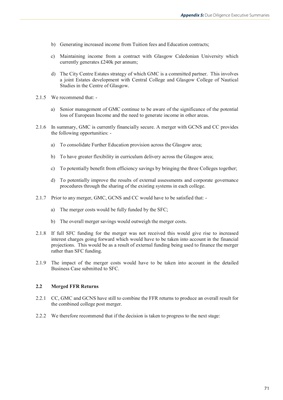
b) Generating increased income from Tuition fees and Education contracts;
c) Maintaining income from a contract with Glasgow Caledonian University which
currently generates £240k per annum;
d) The City Centre Estates strategy of which GMC is a committed partner. This involves
a joint Estates development with Central College and Glasgow College of Nautical
Studies in the Centre of Glasgow.
2.1.5 We recommend that: -
a) Senior management of GMC continue to be aware of the significance of the potential
loss of European Income and the need to generate income in other areas.
2.1.6 In summary, GMC is currently financially secure. A merger with GCNS and CC provides
the following opportunities: -
a) To consolidate Further Education provision across the Glasgow area;
b) To have greater flexibility in curriculum delivery across the Glasgow area;
c) To potentially benefit from efficiency savings by bringing the three Colleges together;
d) To potentially improve the results of external assessments and corporate governance
procedures through the sharing of the existing systems in each college.
2.1.7 Prior to any merger, GMC, GCNS and CC would have to be satisfied that: -
a) The merger costs would be fully funded by the SFC;
b) The overall merger savings would outweigh the merger costs.
2.1.8 If full SFC funding for the merger was not received this would give rise to increased
interest charges going forward which would have to be taken into account in the financial
projections. This would be as a result of external funding being used to finance the merger
rather than SFC funding.
2.1.9 The impact of the merger costs would have to be taken into account in the detailed
Business Case submitted to SFC.
2.2 Merged FFR Returns
2.2.1 CC, GMC and GCNS have still to combine the FFR returns to produce an overall result for
the combined college post merger.
2.2.2 We therefore recommend that if the decision is taken to progress to the next stage:
71
Appendix 5: Due Diligence Executive Summaries